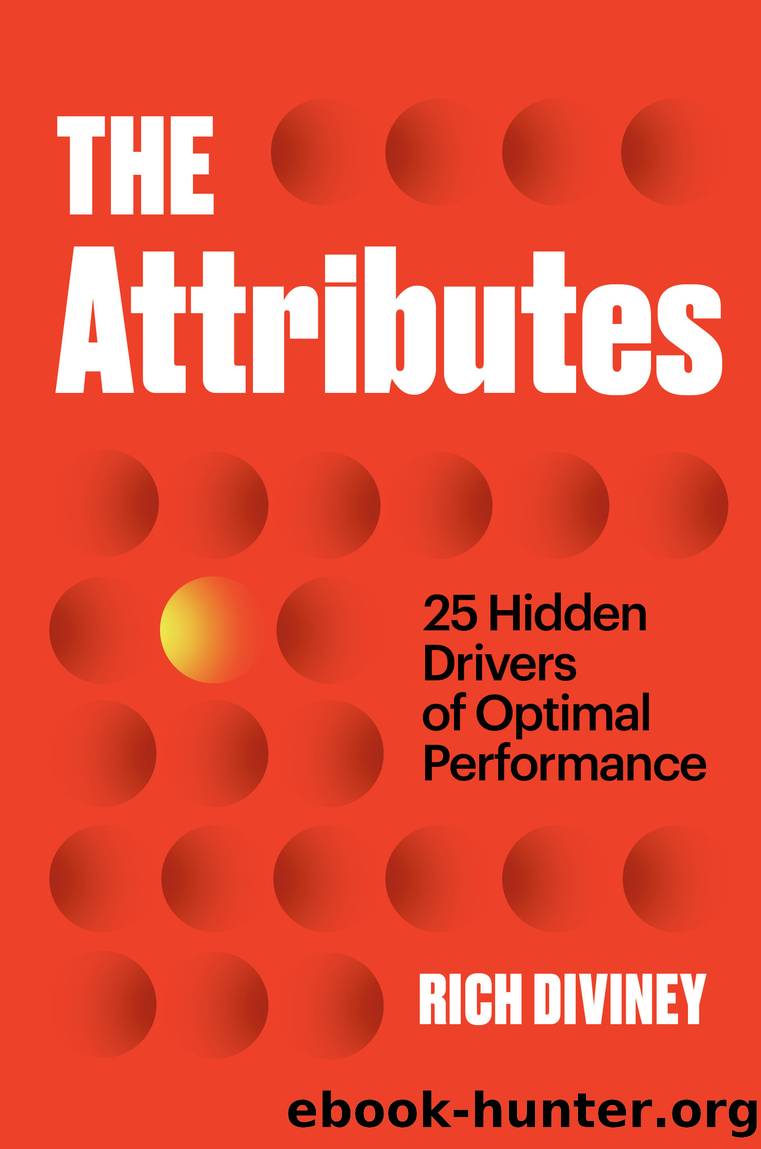The Attributes by Rich Diviney

Author:Rich Diviney [Diviney, Rich]
Language: eng
Format: epub
Publisher: Random House Publishing Group
Published: 2021-01-26T00:00:00+00:00
* * *
â
TO SEE HOW THIS works, letâs consider my perception of roller coasters, which is this: Theyâre awful.
When I was ten years old, our family went to Disney World and we all rode Space Mountain. It was the first time any of us kidsâme, my twin brother, our little brother, and our older sisterâhad been on a roller coaster, and we had no idea what to expect. Space Mountain would be a fairly tame coaster, except itâs inside a dark building so you have no spatial awareness, no sense of where itâll lurch next. All I remember is a long, slow climb up a steep incline, a slight hesitation at the top, and then a plunge into a black abyss. Everything after that was utter disoriented fear.
When it was over and we stumbled into the Florida sunlight, I was dizzy with relief and motion sickness. So was my twin. Our little brother was a complete mess, scared and crying. My mother leaned down to comfort him, and he promptly threw up on her. My sister was fine, but my dad was pissed, as fathers tend to be when things go south on a vacation. âAll right,â he snapped at us, âthatâs it for roller coasters.â Except it wasnât: for the rest of our time at Disney, the first, frightened question any of us kids asked before every ride was, âIs this another roller coaster?â
The intensity of that experience forged a neural pathway on our brains. To this day, neither my brothers nor I are roller coaster fans.
My wifeâs perception of roller coasters, on the other hand, is the complete opposite. She loves them. The taller, steeper, faster, and loopier, the better. And thatâs primarily because her brain got wired with a different neural circuit.
She grew up in western Pennsylvania, the youngest of three kids, and her family had been going to Cedar Point, an amusement park in Ohio famous for its roller coasters, for as long as she could remember. For years, she watched her siblings and her parents ride the Geminiâa wooden coaster 125 feet tall that reached sixty miles per hourâalways whooping and hollering and having a grand time. When she was eight years old, she was finally tall enough to ride, too. Like me, her memory of that first ride is blurry, except for the end: Her brother and sister and parents joyously laughing, all of them congratulating her on being such a big girl. She was glowing with pride. So she rode it again. And again and again and again.
When my wife and I get on a roller coaster today, we physically experience the exact same ride. Same long climb, same precipitous drop, same sensation of speed. The sensory input is identical. But her perception of the ride is vastly different from mine because our brains have cataloged roller coasters differently. She loves it, and I do not.
And now the conspicuous question on the page: Why am I riding roller coasters if I donât like them? Because Iâm trying to develop my attribute of open-mindedness.
Download
This site does not store any files on its server. We only index and link to content provided by other sites. Please contact the content providers to delete copyright contents if any and email us, we'll remove relevant links or contents immediately.
The Motivation Myth by Jeff Haden(5191)
Audition by Ryu Murakami(4913)
Adulting by Kelly Williams Brown(4552)
The Confidence Code by Katty Kay(4238)
A Mind For Numbers: How to Excel at Math and Science (Even If You Flunked Algebra) by Barbara Oakley(3288)
Waiting in the Wings by Melissa Brayden(3205)
Self-Esteem by Matthew McKay & Patrick Fanning(3125)
Fooled by Randomness: The Hidden Role of Chance in Life and in the Markets by Nassim Nicholas Taleb(3095)
The ONE Thing by Gary Keller(3055)
Nice Girls Don't Get the Corner Office by Lois P. Frankel(3034)
The Dictionary of Body Language by Joe Navarro(2984)
How to be More Interesting by Edward De Bono(2779)
Designing Your Life by Bill Burnett(2725)
Getting Things Done by David Allen(2684)
The Plant Paradox by Dr. Steven R. Gundry M.D(2597)
Police Exams Prep 2018-2019 by Kaplan Test Prep(2529)
What Color Is Your Parachute? 2015 by Richard N. Bolles(2295)
Dangerous Personalities by Joe Navarro(2273)
When to Jump by Mike Lewis(2236)
